新概念英语二情态动词课件(共39张PPT)
文档属性
| 名称 | 新概念英语二情态动词课件(共39张PPT) |  | |
| 格式 | pptx | ||
| 文件大小 | 856.6KB | ||
| 资源类型 | 教案 | ||
| 版本资源 | 新概念英语 | ||
| 科目 | 英语 | ||
| 更新时间 | 2024-11-24 21:57:46 | ||
图片预览



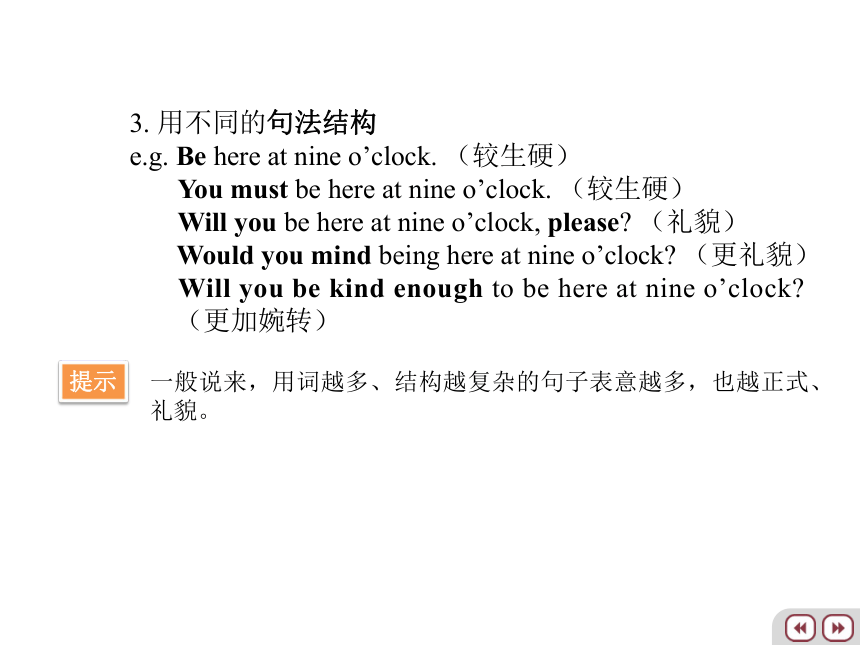
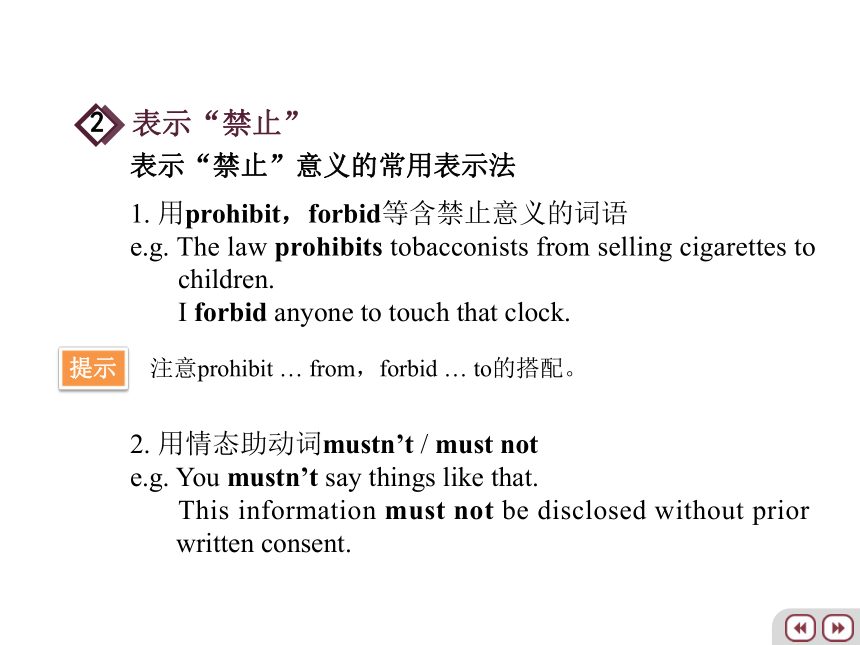

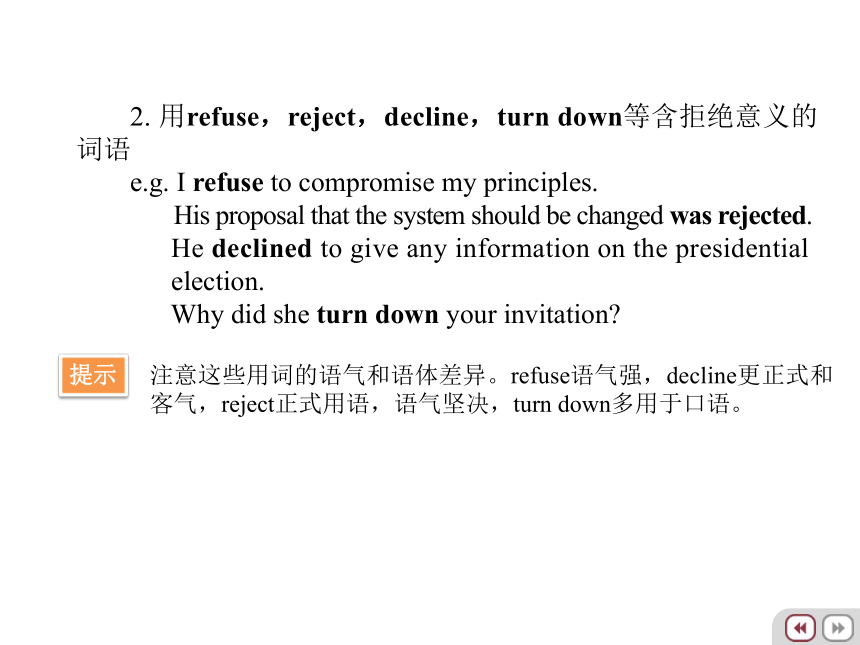


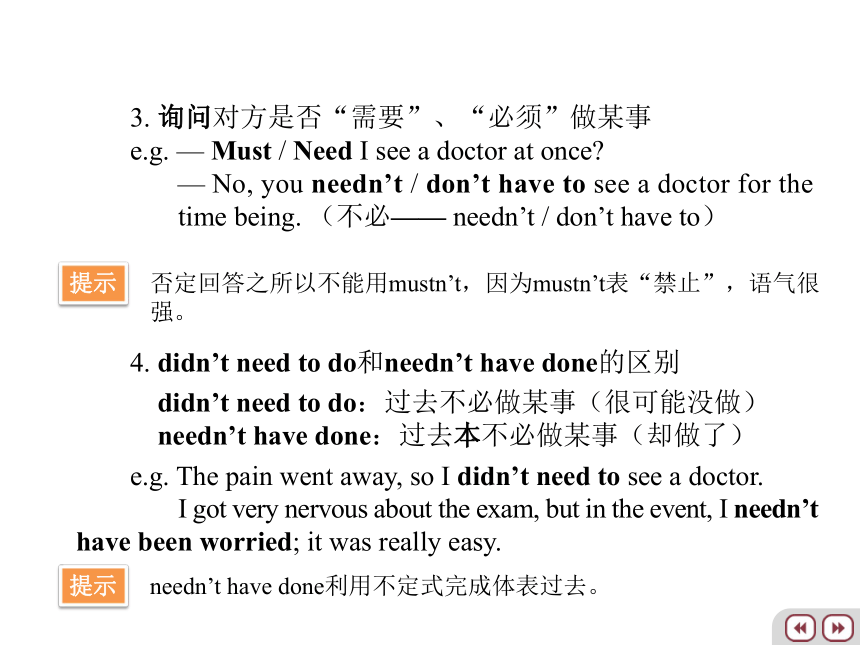
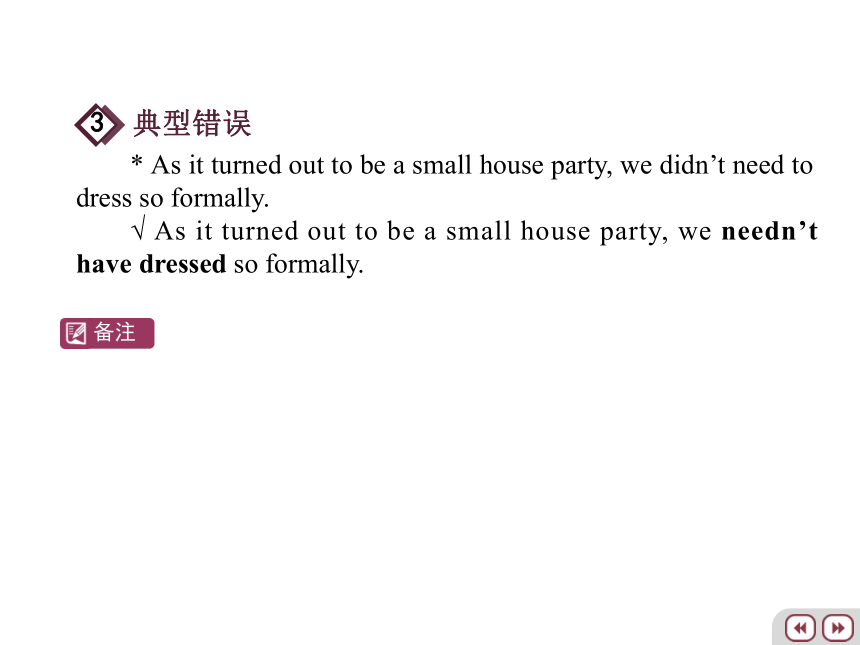
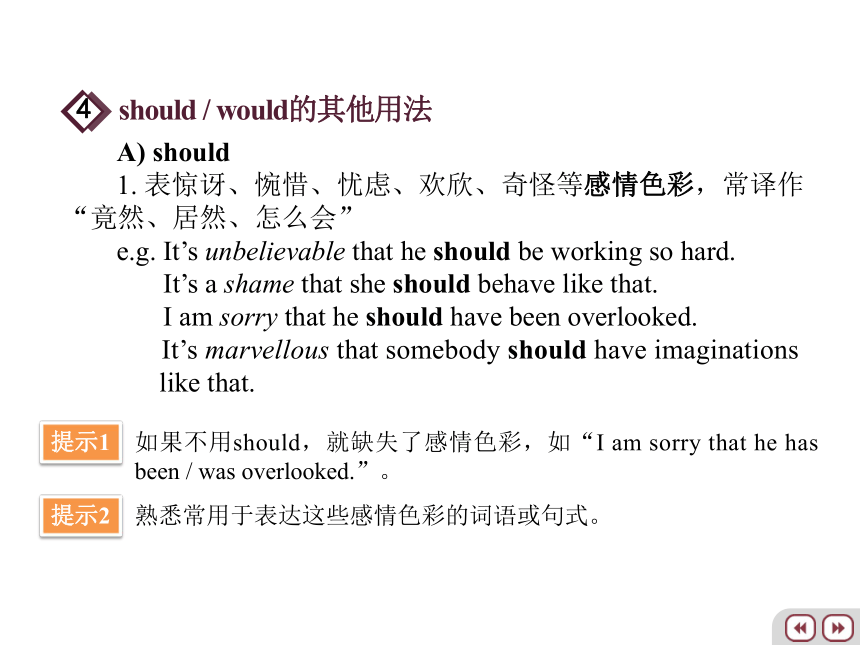
文档简介
(共39张PPT)
掌握“命令”、“禁止”、“拒绝”、“胆敢”、“需要”等情态意义表示法;
should,would表示的其他情态意义;
区分情态助动词的推测性用法和非推测性用法。
本讲的重点:
◆
◆
◆
本讲的难点:
用不同的语气表达“命令”、“禁止”、“拒绝”等意义;
用should表达惊讶、惋惜等感彩及其在目的状语从句中的用法;
needn’t后接不定式完成体的用法;
区分情态助动词的推测性用法和非推测性用法;
能作推测性用法的情态助动词的“可能性”程度递差。
本讲的难点:
◆
◆
◆
◆
◆
用不同的语气表达命令、指示
1. 用语气较生硬的词汇:command,order,instruct
e.g. He commanded / ordered / instructed his men to come
early.
He commanded / ordered / instructed that his men
(should) come early.
2. 用语气较缓和的词汇:ask,request,suggest
e.g. He asked me to come early.
He requested me to help.
I suggested to him that we should tackle the problem
another way.
表示“命令”
1
3. 用不同的句法结构
e.g. Be here at nine o’clock. (较生硬)
You must be here at nine o’clock. (较生硬)
Will you be here at nine o’clock, please (礼貌)
Would you mind being here at nine o’clock (更礼貌)
Will you be kind enough to be here at nine o’clock
(更加婉转)
一般说来,用词越多、结构越复杂的句子表意越多,也越正式、礼貌。
提示
表示“禁止”意义的常用表示法
1. 用prohibit,forbid等含禁止意义的词语
e.g. The law prohibits tobacconists from selling cigarettes to
children.
I forbid anyone to touch that clock.
2. 用情态助动词mustn’t / must not
e.g. You mustn’t say things like that.
This information must not be disclosed without prior
written consent.
表示“禁止”
2
注意prohibit … from,forbid … to的搭配。
提示
3. 用半助动词be not to
e.g. You’re not to enter my room without knocking.
She left strict instructions that she was not to be disturbed.
mustn’t和be not to通常反映的是说话人的意志,是说话人“禁止”(其他人做某事)。
提示
表示“拒绝”意义的常用表示法
1. 用won’t / will not,wouldn’t / would not等表意愿的情态助动词的否定式
e.g. I 'won’t do it.
He 'wouldn’t answer any questions.
表示“拒绝”
3
助动词won’t,wouldn’t通常不重读,但表达拒绝需要重读。
提示
2. 用refuse,reject,decline,turn down等含拒绝意义的词语
e.g. I refuse to compromise my principles.
His proposal that the system should be changed was rejected.
He declined to give any information on the presidential
election.
Why did she turn down your invitation
注意这些用词的语气和语体差异。refuse语气强,decline更正式和客气,reject正式用语,语气坚决,turn down多用于口语。
提示
1. 情态助动词dare常用于否定句和疑问句
e.g. I dare not go there.
How dare you talk to me like that
2. dare的现在时形式既可以指现在也可以指过去,通常不用dared指过去
e.g. Tom wanted to come, but he daren’t.
3. 主动词dare也常用于否定句和疑问句,随后的不定式可带to,也可不带to。
e.g. She didn’t dare (to) say anything about it.
Does he dare (to) go there alone
表示“胆敢”:dare
1
惯用语I dare say(我想;可能)除外,如“I dare say you know about it already.”。
提示
过去式形式dared仅用于文学语体否定意义的句子中。
提示
1. 情态助动词need常用于否定句和疑问句
e.g. He needn’t worry about it. (不必)
Need I collect the parcel myself (需要)
2. 对need疑问句的回答
e.g. — Need we work late today
— No, but we must tomorrow. (必须—— must)
— Need I tell Elizabeth at once
— No, you needn’t tell her just yet. (不必—— needn’t)
表示“需要”:need
2
3. 询问对方是否“需要”、“必须”做某事
e.g. — Must / Need I see a doctor at once
— No, you needn’t / don’t have to see a doctor for the
time being. (不必—— needn’t / don’t have to)
4. didn’t need to do和needn’t have done的区别
didn’t need to do:过去不必做某事(很可能没做)
needn’t have done:过去本不必做某事(却做了)
e.g. The pain went away, so I didn’t need to see a doctor.
I got very nervous about the exam, but in the event, I needn’t have been worried; it was really easy.
否定回答之所以不能用mustn’t,因为mustn’t表“禁止”,语气很强。
提示
needn’t have done利用不定式完成体表过去。
提示
* As it turned out to be a small house party, we didn’t need to dress so formally.
√ As it turned out to be a small house party, we needn’t have dressed so formally.
典型错误
3
备注
A) should
1. 表惊讶、惋惜、忧虑、欢欣、奇怪等感彩,常译作“竟然、居然、怎么会”
e.g. It’s unbelievable that he should be working so hard.
It’s a shame that she should behave like that.
I am sorry that he should have been overlooked.
It’s marvellous that somebody should have imaginations
like that.
should / would的其他用法
4
如果不用should,就缺失了感彩,如“I am sorry that he has been / was overlooked.”。
熟悉常用于表达这些感彩的词语或句式。
提示1
提示2
2. 用于某些惯用的疑问句和感叹句中
e.g. Why should he be resigning (他为什么要辞职呢?)
That he should dare to attack me! (想不到他竟敢攻击
我!)
3. 作为be-型虚拟式的替换形式
e.g. I insisted that he go / should go with me.
It is imperative that we have / should have a strong air force.
be-型虚拟式常见于美式英语,在英式英语常用should +不定式或动词的陈述式。
提示
4. 用于for fear that,lest,so that,in order that等引导的目的状语分句中
e.g. They got warmly dressed for fear that they should catch
cold.
She took a taxi to the station so that she should not miss
the train.
He ran away lest he should be found by people.
B) would
1. 用于婉转陈述自己的看法
e.g. It would be a shame to stop our work halfway.
(要是…就太可惜了)
Aren’t you tired I would / should have thought you had
done enough for today. (我本该想到…)
lest引导的状语分句也可用be-型虚拟式。
提示
2. 用于婉转提出要求、邀请或问题
e.g. Would you mind my reading aloud here
What would you advise me to do
3. 用于婉转建议或劝告
e.g. Wouldn’t it be better for us to start off a little earlier
tomorrow morning (…会不会更好?)
It wouldn’t be a bad idea for us to hold two separate meetings
for the two problems.
因为过去时的使用显得离现实更遥远,因而更不确定,也就更婉转。
提示
1. 推测性用法:“可能”、“必然”、“预测”等涉及人们对事情发生的可能性大小所作的主观判断。
非推测性用法:“能力”、“许可”、“意志”、“义务”等涉及人对事件的控制。
情态助动词的推测性和非推测性用法
能作推测性用法的情态助动词
1
情态助动词 非推测性用法 推测性用法
can / could 表“能力”、“许可” 表“可能”
may / might 表“许可” 表“可能”
will / would 表“意志” 表“推测”
should / ought to 表“义务” 表“必然”
must 表“义务” 表“必然”
2. 能作推测性用法的情态助动词“可能性”程度的递差性
might → may → could →can
Possible
→ should → ought to → would→ will →must
Probable Certain
may比can更正式;ought to比should更强调客观性;过去式形式更“遥远”,比原形更加不确定。
表示“可能”的can主要用于否定句和疑问句。
提示1
提示2
注意以下几点:
1. 接不定式完成体——对过去事态的推测;
接不定式进行体——对现在或对将来事态的推测。
e.g. As no pumas had been reported missing from any zoo in
the country, this one must have been in the possession of
a private collector and somehow managed to escape. (过去)
He must be working late at the office. (现在)
He must be calling tonight. (将来)
能作推测性用法的情态助动词的句法特征
2
通过不定式的完成体表过去时间。
接不定式进行体表将来,通常带有表将来的时间状语。
提示1
提示2
2. can have done只能用在否定句和疑问句中,而could have done却无此限制。
e.g. John can’t have done it. He is so kind.
Can he have said it
The accident could have been prevented.
3. must一般不用否定完成体,其否定式一般用can’t have done。
e.g. She can’t have left the house yet because her car is still
outside.
— “My ankle really hurts.”
— “Well, you can’t have broken it if you can still walk.”
注意如下三点:
1. 我们可以现在对现在事态作出推测,也可以现在对过去或将来事态作出推测。
2. 作出推测的时间几乎总是“现在”,与情态助动词的形式及其后的不定式形式无关。
3. 推测的内容发生的时间则取决于情态助动词之后不定式的时体形式。
主要情形:
(1)推测性情态助动词 + 不定式一般形式 现在时间 + 现在时间 / 将来时间
能作推测性用法的情态助动词与所指时间
3
e.g. He must be there.
= I’m sure (that) he is there. (现在 + 现在)
Our team might win the race.
=It is possible that our team will win the race.
(现在 + 将来)
(2)推测性情态助动词+不定式一般进行体形式 现在时间 + 现在时间 / 将来时间
e.g. He must be working late at the office.
=I’m sure that he is working late at the office.
(现在 + 现在)
He must be calling tonight.
=I’m sure that he is calling tonight. (现在 + 将来)
结合时间状语,现在进行体is calling用以表将来时间。
提示
(3)推测性情态助动词 + 不定式完成体形式 现在时间 + 过去时间
e.g. He is free now. He must have finished the homework.
=I’m sure that he has finished the homework.
He may have come last year.
=It is possible that he came last year.
(4)推测性情态助动词+不定式完成进行体形式 现在时间 + 过去时间
e.g. They can’t have been waiting so long.
=I can’t believe that they have been waiting so long.
He must have been dozing.
=I’m sure he was dozing.
利用不定式完成体表过去,可根据语境解释为现在完成体或一般过去时。
提示
“It’s a shame that the city official should have gone back on his word.” The modal auxiliary SHOULD expresses _________.
A.
B.
C.
D.
obligation
disappointment
future in the past
tentativeness
该题考查should表达感彩的用法。在It’s a shame that后的主语从句中should表达惋惜、失望等感彩,该句意为“真遗憾,这位市政官员竟然食言了”,因此B“失望”为正确答案。
“It’s a shame that the city official should have gone back on his word.”一句中情态助动词SHOULD表达________。
Among the four sentences below, Sentence ________ expresses the highest degree of possibility.
A.
B.
C.
D.
It may take a long time to find a solution to the problem.
It might take a long time to find a solution to the problem.
It could take a long time to find a solution to the problem.
It should take a long time to find a solution to the problem.
该题考查能作推测性用法的情态助动词表达“可能性”程度的大小。英语中九个能作推测性用法的情态助动词,根据“可能性”程度不同所表现出的递差性由低到高依次为:might → may → could → can → should → ought to → would → will → must,因此在may,might,could,should四个情态助动词中should的可能性最大。
下列四句话中,句_____表达最高程度的可能性。
Aren’t you tired I ________ you had done enough for today.
A.
B.
C.
D.
should have thought
must have thought
might have thought
could have thought
该题考查should用于委婉的陈述的用法。“should +不定式完成体”表达本来应该做却没有做,A项should have thought意为“本来应该想到而实际没有”,符合此处的逻辑语义关系,这里的should用于委婉的陈述,也可用would。其他选项均不符合逻辑,因此A为正确答案。
你很累了吧?我本应想到你今天已经做的够多了。
Loudspeakers were fixed in the hall so that everyone ______ an opportunity to hear the speech.
A.
B.
C.
D.
ought to have
must have
may have
should have
该题考查情态助动词should在目的状语从句中的用法。情态助动词should可用在目的状语从句中,而不带具体的情态意义。该句为so that引导的目的状语从句,情态助动词应该用should,因此D为正确答案。
礼堂里装上了大喇叭,这样每个人都会有机会听到发言。
I am surprised _______ this city is a dull place to live in.
A.
B.
C.
D.
that you should think
by what you are thinking
that you would think
with what you were thinking
该题考查情态助动词should在某些that-分句中表感彩的用法。should在某些that-分句中可表惊讶、惋惜等感彩。根据主句I am surprised可知,该句可用should在that-分句中表惊讶,意为“竟然”,因此A为正确答案。
令我感到吃惊的是,你竟然会认为住在这个城市很乏味。
You ______ Jim anything about it. It was none of his business.
A.
B.
C.
D.
needn’t have told
needn’t tell
mustn’t have told
mustn’t tell
该题考查情态助动词“needn’t +不定式完成体”的用法。needn’t have done表示过去本不必做却做了,“It was none of his business”表明当时这件事与他无关,“当时你本没有必要告诉他”,因此A项needn’t have told为正确答案。没有C项mustn’t have done的形式,但可以说can’t have done,表示过去不大可能做。B、D两项时态与题意不符。
你本没有必要把这件事告诉吉姆,这件事与他无关。
本讲从语义的角度介绍“命令”、“禁止”、“拒绝”、“胆敢”、“需要”等情态意义表示法,总结区分了情态助动词的推测性用法和非推测性用法。学习中建议以语义为纽带掌握“命令”、“禁止”、“拒绝”、“需要”等各种情态意义的常用表示法,熟悉不同用词的语用场合。should的其他用法可重点关注should表达惊讶、惋惜等感彩的用法以及should在目的状语从句中的用法,would的其他用法多与婉转口气有关。情态助动词的推测性用法和非推测性用法是对情态助动词用法的一个总结归纳,多数情态助动词都有这两种用法,其主要区别在于是否涉及说话人的主观判断。在语境中区分情态助动词的各种推测性用法和非推测性用法是一个学习难点。掌握能作推测性用法的情态助动词“可能
性”程度的递差性:从possibility(might→may→could→can),到probability(should→ought to→would→will),再到certainty(must)。能作推测性用法的情态助动词与所指时间的基本关系为:作出推测的时间几乎总是“现在”,与情态助动词的形式及其后的不定式形式无关;而推测的内容发生的时间则取决于情态助动词之后不定式的时体形式。情态助动词接不定式完成体通常是对过去事态的推测,接不定式一般进行体是对现在或对将来事态的推测。
1.0
2.
0
3.0
4.
If your main parachute (降落伞) ________ fail to open, your second one will open automatically.
A: ________ you mind not smoking; this is the petrol store.
B: Then there ________ be a “No Smoking” notice.
If you ________ kindly wait here a minute, I’ll ring the director’s office.
It is amazing that the Leaning Tower of Pisa (比萨斜塔) ________ have stood for so long.
should
Would
would
should
Put should or would in the spaces in the following sentences.
should
5.0
6.
0
7.
0
8.
The rocks were icy and he was terrified lest he ________ slip.
He resigned from the government in order that everyone ________ know that he disapproved of the new policy.
It is absurd that women ________ be paid less than men for doing the same work.
________ these measures fail to restore order harsher restrictions will have to be imposed.
should
should
should
Should
9.0
10.
A: You complained to the manager, of course
B: No. I asked to speak to him but he ________ not come to the phone.
A: You ________ have insisted.
I can’t repair it now, but if you ________ like to leave it with me I’ll see what can be done.
would
would
should
1.0
2.0
3.
0
4.0
5.
Perhaps he is working for Simons.
Perhaps he was working for Simons.
I don’t think he is working now.
I’m sure that they are waiting.
It is possible, but not very possible, that it is true.
He may be working for Simons.
He may have been working for Simons.
He won’t be working now.
They must be waiting.
That might be true.
Rephrase, using “modal auxiliary + the correct form of the infinitive”.
6.0
7.0
8.
It is reasonable to assume that you were disappointed.
It is not possible that he is there.
It is not even barely possible that he made that mistake.
You must have been disappointed.
He can’t be there.
He couldn’t have made that mistake.
Sue:
Elizabeth:
I wonder where Peter’s got to. He said he’d be here in time for lunch. I’m rather worried.
Don’t worry! He (1) ________ still come.
Insert the correct form from the following, using each form only once.
can might be could might have
may perhaps may have possible
may have had possibly might
(Sue was expecting Peter to take the afternoon off in order to do some urgent work on the house. But he hasn’t arrived. Sue and her sister are discussing what may have happened to him.)
根据语境,Elizabeth劝说Sue不要担心,她认为Peter仍然有可能来。may表示可能性,后接不定式的一般形式表示对现在情况的推测,意为“也许;可能”。注意:用can表可能性时,常用于否定句和疑问句中。
may
may
Sue:
Elizabeth:
Sue:
Elizabeth:
Sue:
I doubt it. It’s past 2 o’clock. But I do think he (2) __________ rung me up!
He (3) _________ done, and we didn’t hear the phone! Or (4) ________ his boss couldn’t give him time off, after all!
Yes, that’s (5) ________, I suppose.
Or the car’s broken down again on the way home, (6) ________!
Yes, he said that he thought it (7) _______ well do so if he drove too fast!
might have
can might be could might have
may perhaps may have possible
may have had possibly might
might have
may
may have
may have
possibly
possibly
possible
possible
perhaps
perhaps
might
might
根据语境,Elizabeth比Sue更相信Peter能赶来,用may表示“可能”比might更肯定,符合语境。表示对过去发生事情所作的不太肯定的推测,用“may +不定式完成体”。
根据语境,Elizabeth推测Peter可能会赶来,这里提供Peter未及时赶来的另一种可能的原因,该句不缺少谓语动词,可以用副词possibly表达“可能性”。
该句缺少形容词作主语补语,可用形容词possible表“可能”。
根据语境,该句Elizabeth猜测了第三种可能,副词perhaps意为“可能;也许”,可置于句首或句尾。
may well意为“很可能;有充分理由能”,用于加强推测的语气,表示具有较大的可能性。由于主句是过去时,宾语从句也应该用过去时might。
根据语境,Sue对Peter能赶来表示怀疑。might表示“可能”,比may更加不确定,符合语境。表示对过去发生事情所作的不太肯定的推测,用“might +不定式完成体”,might have rung me up意为“或许已经给我打过电话了”。
Elizabeth:
Sue:
Elizabeth:
Oh dear! If he’s stuck on that lonely stretch of country road he won’t be home until midnight! You (8) ________ wait an hour for another car to pass!
Or he (9) _____________ an accident! Do you think I should phone the police
Gracious, no! Don’t fuss! He (10) ________ be on his way right now!
(Ten minutes later, the phone rings.)
can
can might be could might have
may perhaps may have possible
may have had possibly might
can
may
may have
possibly
possible
perhaps
might
might have
may have had
may have had
could
could
根据语境,Sue猜测了第四种可能。may表“可能”,表示对过去发生事情所作的不太肯定的推测,可用“may +不定式完成体”,may have had an accident意为“可能已发生事故”。
根据语境,Elizabeth不认同Sue的猜测,她认为Peter有可能正在回来的路上。could表“可能”,比may更肯定一些,符合语境,后接不定式表示对现在情况的推测。
根据语境,Elizabeth猜测如果Peter的车坏在了乡间小路,那要到午夜才能到家,因为在那样偏僻的地方人们是很难打到车的。这里可以用can表示“逻辑上的可能”。can表“可能”较多用在疑问句、否定句中,用在肯定句中仅表“逻辑上的可能”。注意:这里的you作类指用法。
Peter:
Sue:
Sorry, Sue, but I can’t get away from the office. An urgent piece of work. I shall be pretty late, I expect. It (11) ________ 8 or 9 before I get home. I hope you weren’t starting to worry!
Gracious, no! Of course not!
might be
can might be could might have
may perhaps may have possible
may have had possibly might
might be
may
may have
possibly
possible
perhaps
might
might have
may have had
could
can
根据语境,Peter打电话说明自己晚一点儿回去,但对到家的时间还不太确定。可用might表示“可能”,语气上比may更加不确定,符合语境,后接不定式表示对将来情况不太肯定的推测。
掌握“命令”、“禁止”、“拒绝”、“胆敢”、“需要”等情态意义表示法;
should,would表示的其他情态意义;
区分情态助动词的推测性用法和非推测性用法。
本讲的重点:
◆
◆
◆
本讲的难点:
用不同的语气表达“命令”、“禁止”、“拒绝”等意义;
用should表达惊讶、惋惜等感彩及其在目的状语从句中的用法;
needn’t后接不定式完成体的用法;
区分情态助动词的推测性用法和非推测性用法;
能作推测性用法的情态助动词的“可能性”程度递差。
本讲的难点:
◆
◆
◆
◆
◆
用不同的语气表达命令、指示
1. 用语气较生硬的词汇:command,order,instruct
e.g. He commanded / ordered / instructed his men to come
early.
He commanded / ordered / instructed that his men
(should) come early.
2. 用语气较缓和的词汇:ask,request,suggest
e.g. He asked me to come early.
He requested me to help.
I suggested to him that we should tackle the problem
another way.
表示“命令”
1
3. 用不同的句法结构
e.g. Be here at nine o’clock. (较生硬)
You must be here at nine o’clock. (较生硬)
Will you be here at nine o’clock, please (礼貌)
Would you mind being here at nine o’clock (更礼貌)
Will you be kind enough to be here at nine o’clock
(更加婉转)
一般说来,用词越多、结构越复杂的句子表意越多,也越正式、礼貌。
提示
表示“禁止”意义的常用表示法
1. 用prohibit,forbid等含禁止意义的词语
e.g. The law prohibits tobacconists from selling cigarettes to
children.
I forbid anyone to touch that clock.
2. 用情态助动词mustn’t / must not
e.g. You mustn’t say things like that.
This information must not be disclosed without prior
written consent.
表示“禁止”
2
注意prohibit … from,forbid … to的搭配。
提示
3. 用半助动词be not to
e.g. You’re not to enter my room without knocking.
She left strict instructions that she was not to be disturbed.
mustn’t和be not to通常反映的是说话人的意志,是说话人“禁止”(其他人做某事)。
提示
表示“拒绝”意义的常用表示法
1. 用won’t / will not,wouldn’t / would not等表意愿的情态助动词的否定式
e.g. I 'won’t do it.
He 'wouldn’t answer any questions.
表示“拒绝”
3
助动词won’t,wouldn’t通常不重读,但表达拒绝需要重读。
提示
2. 用refuse,reject,decline,turn down等含拒绝意义的词语
e.g. I refuse to compromise my principles.
His proposal that the system should be changed was rejected.
He declined to give any information on the presidential
election.
Why did she turn down your invitation
注意这些用词的语气和语体差异。refuse语气强,decline更正式和客气,reject正式用语,语气坚决,turn down多用于口语。
提示
1. 情态助动词dare常用于否定句和疑问句
e.g. I dare not go there.
How dare you talk to me like that
2. dare的现在时形式既可以指现在也可以指过去,通常不用dared指过去
e.g. Tom wanted to come, but he daren’t.
3. 主动词dare也常用于否定句和疑问句,随后的不定式可带to,也可不带to。
e.g. She didn’t dare (to) say anything about it.
Does he dare (to) go there alone
表示“胆敢”:dare
1
惯用语I dare say(我想;可能)除外,如“I dare say you know about it already.”。
提示
过去式形式dared仅用于文学语体否定意义的句子中。
提示
1. 情态助动词need常用于否定句和疑问句
e.g. He needn’t worry about it. (不必)
Need I collect the parcel myself (需要)
2. 对need疑问句的回答
e.g. — Need we work late today
— No, but we must tomorrow. (必须—— must)
— Need I tell Elizabeth at once
— No, you needn’t tell her just yet. (不必—— needn’t)
表示“需要”:need
2
3. 询问对方是否“需要”、“必须”做某事
e.g. — Must / Need I see a doctor at once
— No, you needn’t / don’t have to see a doctor for the
time being. (不必—— needn’t / don’t have to)
4. didn’t need to do和needn’t have done的区别
didn’t need to do:过去不必做某事(很可能没做)
needn’t have done:过去本不必做某事(却做了)
e.g. The pain went away, so I didn’t need to see a doctor.
I got very nervous about the exam, but in the event, I needn’t have been worried; it was really easy.
否定回答之所以不能用mustn’t,因为mustn’t表“禁止”,语气很强。
提示
needn’t have done利用不定式完成体表过去。
提示
* As it turned out to be a small house party, we didn’t need to dress so formally.
√ As it turned out to be a small house party, we needn’t have dressed so formally.
典型错误
3
备注
A) should
1. 表惊讶、惋惜、忧虑、欢欣、奇怪等感彩,常译作“竟然、居然、怎么会”
e.g. It’s unbelievable that he should be working so hard.
It’s a shame that she should behave like that.
I am sorry that he should have been overlooked.
It’s marvellous that somebody should have imaginations
like that.
should / would的其他用法
4
如果不用should,就缺失了感彩,如“I am sorry that he has been / was overlooked.”。
熟悉常用于表达这些感彩的词语或句式。
提示1
提示2
2. 用于某些惯用的疑问句和感叹句中
e.g. Why should he be resigning (他为什么要辞职呢?)
That he should dare to attack me! (想不到他竟敢攻击
我!)
3. 作为be-型虚拟式的替换形式
e.g. I insisted that he go / should go with me.
It is imperative that we have / should have a strong air force.
be-型虚拟式常见于美式英语,在英式英语常用should +不定式或动词的陈述式。
提示
4. 用于for fear that,lest,so that,in order that等引导的目的状语分句中
e.g. They got warmly dressed for fear that they should catch
cold.
She took a taxi to the station so that she should not miss
the train.
He ran away lest he should be found by people.
B) would
1. 用于婉转陈述自己的看法
e.g. It would be a shame to stop our work halfway.
(要是…就太可惜了)
Aren’t you tired I would / should have thought you had
done enough for today. (我本该想到…)
lest引导的状语分句也可用be-型虚拟式。
提示
2. 用于婉转提出要求、邀请或问题
e.g. Would you mind my reading aloud here
What would you advise me to do
3. 用于婉转建议或劝告
e.g. Wouldn’t it be better for us to start off a little earlier
tomorrow morning (…会不会更好?)
It wouldn’t be a bad idea for us to hold two separate meetings
for the two problems.
因为过去时的使用显得离现实更遥远,因而更不确定,也就更婉转。
提示
1. 推测性用法:“可能”、“必然”、“预测”等涉及人们对事情发生的可能性大小所作的主观判断。
非推测性用法:“能力”、“许可”、“意志”、“义务”等涉及人对事件的控制。
情态助动词的推测性和非推测性用法
能作推测性用法的情态助动词
1
情态助动词 非推测性用法 推测性用法
can / could 表“能力”、“许可” 表“可能”
may / might 表“许可” 表“可能”
will / would 表“意志” 表“推测”
should / ought to 表“义务” 表“必然”
must 表“义务” 表“必然”
2. 能作推测性用法的情态助动词“可能性”程度的递差性
might → may → could →can
Possible
→ should → ought to → would→ will →must
Probable Certain
may比can更正式;ought to比should更强调客观性;过去式形式更“遥远”,比原形更加不确定。
表示“可能”的can主要用于否定句和疑问句。
提示1
提示2
注意以下几点:
1. 接不定式完成体——对过去事态的推测;
接不定式进行体——对现在或对将来事态的推测。
e.g. As no pumas had been reported missing from any zoo in
the country, this one must have been in the possession of
a private collector and somehow managed to escape. (过去)
He must be working late at the office. (现在)
He must be calling tonight. (将来)
能作推测性用法的情态助动词的句法特征
2
通过不定式的完成体表过去时间。
接不定式进行体表将来,通常带有表将来的时间状语。
提示1
提示2
2. can have done只能用在否定句和疑问句中,而could have done却无此限制。
e.g. John can’t have done it. He is so kind.
Can he have said it
The accident could have been prevented.
3. must一般不用否定完成体,其否定式一般用can’t have done。
e.g. She can’t have left the house yet because her car is still
outside.
— “My ankle really hurts.”
— “Well, you can’t have broken it if you can still walk.”
注意如下三点:
1. 我们可以现在对现在事态作出推测,也可以现在对过去或将来事态作出推测。
2. 作出推测的时间几乎总是“现在”,与情态助动词的形式及其后的不定式形式无关。
3. 推测的内容发生的时间则取决于情态助动词之后不定式的时体形式。
主要情形:
(1)推测性情态助动词 + 不定式一般形式 现在时间 + 现在时间 / 将来时间
能作推测性用法的情态助动词与所指时间
3
e.g. He must be there.
= I’m sure (that) he is there. (现在 + 现在)
Our team might win the race.
=It is possible that our team will win the race.
(现在 + 将来)
(2)推测性情态助动词+不定式一般进行体形式 现在时间 + 现在时间 / 将来时间
e.g. He must be working late at the office.
=I’m sure that he is working late at the office.
(现在 + 现在)
He must be calling tonight.
=I’m sure that he is calling tonight. (现在 + 将来)
结合时间状语,现在进行体is calling用以表将来时间。
提示
(3)推测性情态助动词 + 不定式完成体形式 现在时间 + 过去时间
e.g. He is free now. He must have finished the homework.
=I’m sure that he has finished the homework.
He may have come last year.
=It is possible that he came last year.
(4)推测性情态助动词+不定式完成进行体形式 现在时间 + 过去时间
e.g. They can’t have been waiting so long.
=I can’t believe that they have been waiting so long.
He must have been dozing.
=I’m sure he was dozing.
利用不定式完成体表过去,可根据语境解释为现在完成体或一般过去时。
提示
“It’s a shame that the city official should have gone back on his word.” The modal auxiliary SHOULD expresses _________.
A.
B.
C.
D.
obligation
disappointment
future in the past
tentativeness
该题考查should表达感彩的用法。在It’s a shame that后的主语从句中should表达惋惜、失望等感彩,该句意为“真遗憾,这位市政官员竟然食言了”,因此B“失望”为正确答案。
“It’s a shame that the city official should have gone back on his word.”一句中情态助动词SHOULD表达________。
Among the four sentences below, Sentence ________ expresses the highest degree of possibility.
A.
B.
C.
D.
It may take a long time to find a solution to the problem.
It might take a long time to find a solution to the problem.
It could take a long time to find a solution to the problem.
It should take a long time to find a solution to the problem.
该题考查能作推测性用法的情态助动词表达“可能性”程度的大小。英语中九个能作推测性用法的情态助动词,根据“可能性”程度不同所表现出的递差性由低到高依次为:might → may → could → can → should → ought to → would → will → must,因此在may,might,could,should四个情态助动词中should的可能性最大。
下列四句话中,句_____表达最高程度的可能性。
Aren’t you tired I ________ you had done enough for today.
A.
B.
C.
D.
should have thought
must have thought
might have thought
could have thought
该题考查should用于委婉的陈述的用法。“should +不定式完成体”表达本来应该做却没有做,A项should have thought意为“本来应该想到而实际没有”,符合此处的逻辑语义关系,这里的should用于委婉的陈述,也可用would。其他选项均不符合逻辑,因此A为正确答案。
你很累了吧?我本应想到你今天已经做的够多了。
Loudspeakers were fixed in the hall so that everyone ______ an opportunity to hear the speech.
A.
B.
C.
D.
ought to have
must have
may have
should have
该题考查情态助动词should在目的状语从句中的用法。情态助动词should可用在目的状语从句中,而不带具体的情态意义。该句为so that引导的目的状语从句,情态助动词应该用should,因此D为正确答案。
礼堂里装上了大喇叭,这样每个人都会有机会听到发言。
I am surprised _______ this city is a dull place to live in.
A.
B.
C.
D.
that you should think
by what you are thinking
that you would think
with what you were thinking
该题考查情态助动词should在某些that-分句中表感彩的用法。should在某些that-分句中可表惊讶、惋惜等感彩。根据主句I am surprised可知,该句可用should在that-分句中表惊讶,意为“竟然”,因此A为正确答案。
令我感到吃惊的是,你竟然会认为住在这个城市很乏味。
You ______ Jim anything about it. It was none of his business.
A.
B.
C.
D.
needn’t have told
needn’t tell
mustn’t have told
mustn’t tell
该题考查情态助动词“needn’t +不定式完成体”的用法。needn’t have done表示过去本不必做却做了,“It was none of his business”表明当时这件事与他无关,“当时你本没有必要告诉他”,因此A项needn’t have told为正确答案。没有C项mustn’t have done的形式,但可以说can’t have done,表示过去不大可能做。B、D两项时态与题意不符。
你本没有必要把这件事告诉吉姆,这件事与他无关。
本讲从语义的角度介绍“命令”、“禁止”、“拒绝”、“胆敢”、“需要”等情态意义表示法,总结区分了情态助动词的推测性用法和非推测性用法。学习中建议以语义为纽带掌握“命令”、“禁止”、“拒绝”、“需要”等各种情态意义的常用表示法,熟悉不同用词的语用场合。should的其他用法可重点关注should表达惊讶、惋惜等感彩的用法以及should在目的状语从句中的用法,would的其他用法多与婉转口气有关。情态助动词的推测性用法和非推测性用法是对情态助动词用法的一个总结归纳,多数情态助动词都有这两种用法,其主要区别在于是否涉及说话人的主观判断。在语境中区分情态助动词的各种推测性用法和非推测性用法是一个学习难点。掌握能作推测性用法的情态助动词“可能
性”程度的递差性:从possibility(might→may→could→can),到probability(should→ought to→would→will),再到certainty(must)。能作推测性用法的情态助动词与所指时间的基本关系为:作出推测的时间几乎总是“现在”,与情态助动词的形式及其后的不定式形式无关;而推测的内容发生的时间则取决于情态助动词之后不定式的时体形式。情态助动词接不定式完成体通常是对过去事态的推测,接不定式一般进行体是对现在或对将来事态的推测。
1.0
2.
0
3.0
4.
If your main parachute (降落伞) ________ fail to open, your second one will open automatically.
A: ________ you mind not smoking; this is the petrol store.
B: Then there ________ be a “No Smoking” notice.
If you ________ kindly wait here a minute, I’ll ring the director’s office.
It is amazing that the Leaning Tower of Pisa (比萨斜塔) ________ have stood for so long.
should
Would
would
should
Put should or would in the spaces in the following sentences.
should
5.0
6.
0
7.
0
8.
The rocks were icy and he was terrified lest he ________ slip.
He resigned from the government in order that everyone ________ know that he disapproved of the new policy.
It is absurd that women ________ be paid less than men for doing the same work.
________ these measures fail to restore order harsher restrictions will have to be imposed.
should
should
should
Should
9.0
10.
A: You complained to the manager, of course
B: No. I asked to speak to him but he ________ not come to the phone.
A: You ________ have insisted.
I can’t repair it now, but if you ________ like to leave it with me I’ll see what can be done.
would
would
should
1.0
2.0
3.
0
4.0
5.
Perhaps he is working for Simons.
Perhaps he was working for Simons.
I don’t think he is working now.
I’m sure that they are waiting.
It is possible, but not very possible, that it is true.
He may be working for Simons.
He may have been working for Simons.
He won’t be working now.
They must be waiting.
That might be true.
Rephrase, using “modal auxiliary + the correct form of the infinitive”.
6.0
7.0
8.
It is reasonable to assume that you were disappointed.
It is not possible that he is there.
It is not even barely possible that he made that mistake.
You must have been disappointed.
He can’t be there.
He couldn’t have made that mistake.
Sue:
Elizabeth:
I wonder where Peter’s got to. He said he’d be here in time for lunch. I’m rather worried.
Don’t worry! He (1) ________ still come.
Insert the correct form from the following, using each form only once.
can might be could might have
may perhaps may have possible
may have had possibly might
(Sue was expecting Peter to take the afternoon off in order to do some urgent work on the house. But he hasn’t arrived. Sue and her sister are discussing what may have happened to him.)
根据语境,Elizabeth劝说Sue不要担心,她认为Peter仍然有可能来。may表示可能性,后接不定式的一般形式表示对现在情况的推测,意为“也许;可能”。注意:用can表可能性时,常用于否定句和疑问句中。
may
may
Sue:
Elizabeth:
Sue:
Elizabeth:
Sue:
I doubt it. It’s past 2 o’clock. But I do think he (2) __________ rung me up!
He (3) _________ done, and we didn’t hear the phone! Or (4) ________ his boss couldn’t give him time off, after all!
Yes, that’s (5) ________, I suppose.
Or the car’s broken down again on the way home, (6) ________!
Yes, he said that he thought it (7) _______ well do so if he drove too fast!
might have
can might be could might have
may perhaps may have possible
may have had possibly might
might have
may
may have
may have
possibly
possibly
possible
possible
perhaps
perhaps
might
might
根据语境,Elizabeth比Sue更相信Peter能赶来,用may表示“可能”比might更肯定,符合语境。表示对过去发生事情所作的不太肯定的推测,用“may +不定式完成体”。
根据语境,Elizabeth推测Peter可能会赶来,这里提供Peter未及时赶来的另一种可能的原因,该句不缺少谓语动词,可以用副词possibly表达“可能性”。
该句缺少形容词作主语补语,可用形容词possible表“可能”。
根据语境,该句Elizabeth猜测了第三种可能,副词perhaps意为“可能;也许”,可置于句首或句尾。
may well意为“很可能;有充分理由能”,用于加强推测的语气,表示具有较大的可能性。由于主句是过去时,宾语从句也应该用过去时might。
根据语境,Sue对Peter能赶来表示怀疑。might表示“可能”,比may更加不确定,符合语境。表示对过去发生事情所作的不太肯定的推测,用“might +不定式完成体”,might have rung me up意为“或许已经给我打过电话了”。
Elizabeth:
Sue:
Elizabeth:
Oh dear! If he’s stuck on that lonely stretch of country road he won’t be home until midnight! You (8) ________ wait an hour for another car to pass!
Or he (9) _____________ an accident! Do you think I should phone the police
Gracious, no! Don’t fuss! He (10) ________ be on his way right now!
(Ten minutes later, the phone rings.)
can
can might be could might have
may perhaps may have possible
may have had possibly might
can
may
may have
possibly
possible
perhaps
might
might have
may have had
may have had
could
could
根据语境,Sue猜测了第四种可能。may表“可能”,表示对过去发生事情所作的不太肯定的推测,可用“may +不定式完成体”,may have had an accident意为“可能已发生事故”。
根据语境,Elizabeth不认同Sue的猜测,她认为Peter有可能正在回来的路上。could表“可能”,比may更肯定一些,符合语境,后接不定式表示对现在情况的推测。
根据语境,Elizabeth猜测如果Peter的车坏在了乡间小路,那要到午夜才能到家,因为在那样偏僻的地方人们是很难打到车的。这里可以用can表示“逻辑上的可能”。can表“可能”较多用在疑问句、否定句中,用在肯定句中仅表“逻辑上的可能”。注意:这里的you作类指用法。
Peter:
Sue:
Sorry, Sue, but I can’t get away from the office. An urgent piece of work. I shall be pretty late, I expect. It (11) ________ 8 or 9 before I get home. I hope you weren’t starting to worry!
Gracious, no! Of course not!
might be
can might be could might have
may perhaps may have possible
may have had possibly might
might be
may
may have
possibly
possible
perhaps
might
might have
may have had
could
can
根据语境,Peter打电话说明自己晚一点儿回去,但对到家的时间还不太确定。可用might表示“可能”,语气上比may更加不确定,符合语境,后接不定式表示对将来情况不太肯定的推测。
同课章节目录
